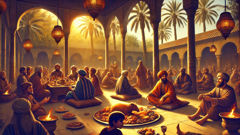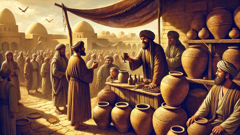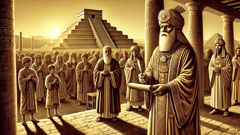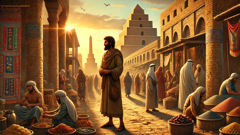Introduction
Between the crumbling mudbrick walls and the bustling market streets of Nippur, the air shimmered with the heat of the Mesopotamian sun. The city, nestled along the banks of the sacred Euphrates, pulsed with life—a mosaic of traders, priests, scribes, and peasants. Here, amid the echo of ancient chants and the scent of dates and spices, lived a man named Gimil-Ninurta. He was a man of simple means, his belongings no more than a worn woolen tunic and a battered pair of sandals. Yet in his chest beat a heart brimming with hope and a mind sharpened by hardship. Gimil-Ninurta’s home was nothing more than a lean-to of reeds and mud, wedged between a date palm and the city’s weathered wall. Each day, he watched as the wealthy and powerful paraded by—jewels glittering on their fingers, servants trailing behind, baskets overflowing with bread, lamb, and honeyed cakes. And yet, for Gimil-Ninurta, every meal was a struggle, every day a test of will. Still, he carried himself with dignity, his eyes bright with an intelligence that neither poverty nor hunger could dull. The people of Nippur often overlooked men like Gimil-Ninurta, but the gods—so the elders said—sometimes favored those who had little, granting them gifts that no silver could buy. This is the tale of how a poor man, armed with nothing but wit and resolve, challenged injustice in the very heart of a city ruled by pride. When the mighty mayor of Nippur, swollen with arrogance and greed, chose to wrong Gimil-Ninurta, he set in motion a contest that would echo down the centuries. For in the ancient world, as in ours, true justice sometimes comes not by decree, but by the clever hands of the downtrodden. This is the story of Gimil-Ninurta and the three times he turned the tables on those who believed themselves untouchable.
The Injustice: The Mayor’s Cruelty
In the days when Nippur’s temples were crowned with gold and her scribes etched stories into clay, Gimil-Ninurta’s life teetered on the edge of despair. His daily labor—hauling water for priests, gathering reeds for builders, sweeping the temple courtyard—barely filled his belly. Yet Gimil-Ninurta kept faith, offering thanks to the gods each dusk. One morning, after a week of foraging roots and wild herbs, fortune smiled on him. He found an old friend in the marketplace, a herdsman from the southern marshes, who pressed a gift into his hands: a skin of fragrant oil and a plump, handsome goat. It was a kingly gift for one so poor. With a heart full of gratitude, Gimil-Ninurta decided to take the goat to the house of the mayor. Surely, he thought, if he honored the most powerful man in the city with such a present, he might receive a fine meal or perhaps a little coin. The mayor’s home was a palace compared to Gimil-Ninurta’s humble shelter—massive wooden doors inlaid with copper, courtyards shaded by date palms, and guards with eyes like hawks. Gimil-Ninurta bowed low, presenting his gift with trembling hands. The mayor, tall and corpulent, regarded him through narrowed eyes. At first, he feigned generosity. He ordered his servants to slaughter the goat and prepare a lavish feast. Gimil-Ninurta watched hungrily as the meat roasted and platters were arranged. But when the time came to eat, the mayor banished Gimil-Ninurta to a corner of the courtyard, tossing him a crust of stale bread and a cup of thin beer. The mayor and his friends reveled deep into the night, gorging on the very goat Gimil-Ninurta had brought. When dawn broke, Gimil-Ninurta was sent away with nothing more than empty words and a sneer. His pride wounded and his stomach empty, he wandered the city’s alleys, wrestling with anger and shame. The story of the mayor’s cruelty spread through the narrow streets like wildfire, but the powerful man cared little for the complaints of the poor. That night, as Gimil-Ninurta stared up at the stars from his reed bed, he swore an oath: the mayor would not have the last laugh. He would repay this injustice threefold, not with violence, but with cunning.

The First Revenge: The Disguise of the Merchant
Gimil-Ninurta’s mind worked furiously as he paced the dusty alleys of Nippur. He knew that the mayor’s pride was his greatest weakness, a chink in the armor of wealth and power. So, he set about crafting a plan. Days passed, and with the little coin he could scrounge, Gimil-Ninurta visited the city’s tailors and barbers. He borrowed a fine robe from a generous friend and bartered for a turban once worn by a minor scribe. When he finally looked in the polished bronze mirror, the reflection was unrecognizable: he appeared every bit the wealthy merchant from Ur. Gimil-Ninurta set out with an air of confidence to the mayor’s house. The guards barely looked at him—after all, merchants were always welcome, bringing gifts or news of distant lands. Gimil-Ninurta announced himself as Enlil-bani, a trader in rare spices and lapis lazuli, seeking to pay respects to the city’s ruler. The mayor, delighted at the prospect of a new connection, ushered him inside with every courtesy. Over sweet wine and bowls of honeyed dates, Gimil-Ninurta spun tales of caravans from Susa and treasures from far-off lands. The mayor, ever hungry for profit, listened greedily. At last, Gimil-Ninurta leaned in, lowering his voice. He explained that he carried with him a chest filled with jewels and precious oils—but that it was too heavy for his old servants to lift. Would the mayor’s strongest men help him carry it to the palace for safekeeping? Eagerly, the mayor dispatched his own guards to Gimil-Ninurta’s ‘lodging’. Instead, they found only a pile of sand and bricks. In the confusion, Gimil-Ninurta—having excused himself to ‘prepare the chest’—slipped out a back gate. The mayor waited for hours, growing ever more furious as he realized he’d been made a fool. The city’s gossip mongers wasted no time, and soon tales of the mayor’s foolishness were whispered in every market stall.

The Second Revenge: The Wine-Seller’s Ruse
But Gimil-Ninurta was not yet satisfied. He remembered too well the cold hunger and stinging humiliation. For his second act, he decided to play on the mayor’s vanity again. This time, he sought out a friend who owned a small wineshop near the city gate. With borrowed jars and a clean cloak, Gimil-Ninurta transformed himself into a humble yet prosperous wine-seller. Word spread quickly through Nippur’s winding lanes that a new shipment of the finest Shirpurla wine had arrived—a vintage said to please even the gods. Gimil-Ninurta positioned himself in the market square, his jars arranged carefully under a faded awning. The aroma of sweet wine drew a crowd, and before long, the mayor himself—having heard tales of the merchant’s trick—came to investigate. Hoping to recoup his lost dignity, the mayor demanded a private tasting. Gimil-Ninurta bowed low, offering a cup of the best wine. With each sip, the mayor’s suspicion waned and his greed grew. Gimil-Ninurta suggested that a cask be delivered to the mayor’s house for a special feast, but warned that only those with keen palates could appreciate its true flavor. The mayor, not wishing to appear ignorant, insisted on purchasing several casks—paying up front in silver. That night, as the mayor uncorked the casks at a banquet, he discovered they were filled not with vintage wine, but with vinegar and river water. The guests mocked him mercilessly. His face flushed with embarrassment, the mayor realized he’d been outwitted once again by the very man he had scorned. Rumors spread like wildfire—now the story was not just about injustice, but about the cleverness of a poor man bringing down the mighty.

The Third Revenge: Justice Served at Last
The mayor’s patience wore thin. Furious, he ordered his guards to hunt down the trickster who had humiliated him twice. But Gimil-Ninurta, ever resourceful, vanished into the labyrinth of Nippur’s alleys and courtyards, aided by friends and strangers who delighted in seeing the mighty brought low. For his final act, Gimil-Ninurta planned to strike not at the mayor’s pride or purse, but at his very sense of authority. He waited until the festival of Enlil—when the city’s leaders paraded through the streets in their finest regalia, bearing offerings to the great ziggurat. Disguised as a temple scribe, with a borrowed reed pen and a tablet inscribed with official-looking marks, Gimil-Ninurta approached the mayor on the morning of the festival. He claimed to carry a summons from the high priest himself: the mayor was to appear before Enlil’s altar at dawn to confess his wrongs before the gods and the people. The mayor, frightened by the prospect of offending the priesthood and thus the gods themselves, rushed to the temple at sunrise. There he was met by a crowd—Gimil-Ninurta’s friends among them—who whispered and pointed. As the mayor stumbled through a public confession, uncertain of what he was supposed to admit, Gimil-Ninurta quietly revealed his true identity to the priests. The high priest, already suspicious of the mayor’s greed and arrogance, saw an opportunity. He questioned the mayor before all, and under the weight of public shame and the gods’ gaze, the mayor confessed to his treatment of Gimil-Ninurta and paid restitution—returning not only what he had stolen, but offering gifts to the poor throughout Nippur. Gimil-Ninurta’s cleverness had turned the tables entirely: he’d won justice for himself and dignity for all those who had been wronged.

Conclusion
From that day forward, Gimil-Ninurta was no longer just another poor face in the crowd. His tale became legend—a story whispered in markets and retold by mothers to their children as they baked bread at dusk. The mayor, chastened and wiser, never again allowed pride or greed to cloud his judgment. In time, he even came to respect Gimil-Ninurta, seeking his counsel in matters requiring sharp wits and fair judgment. As for Gimil-Ninurta, he lived simply still, but with dignity restored and a place of honor among his people. The city of Nippur remembered his courage and cleverness long after both men had passed into history. In the ancient world—and in our own—the meek may be overlooked, but their wisdom can topple giants. Justice, when it comes, may be slow or cunning, but it is never truly denied to those who persist with hope and heart. And so, under the timeless sun that still rises over the ruins of Nippur, the story endures: a reminder that even the poorest among us can change the world with wit and resolve.













